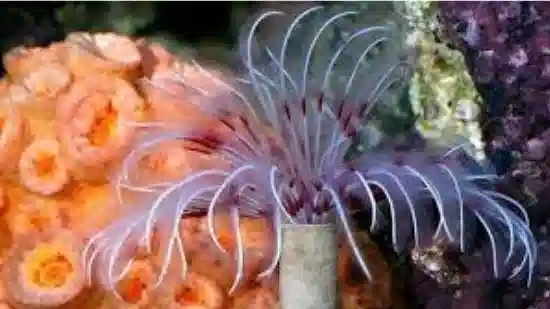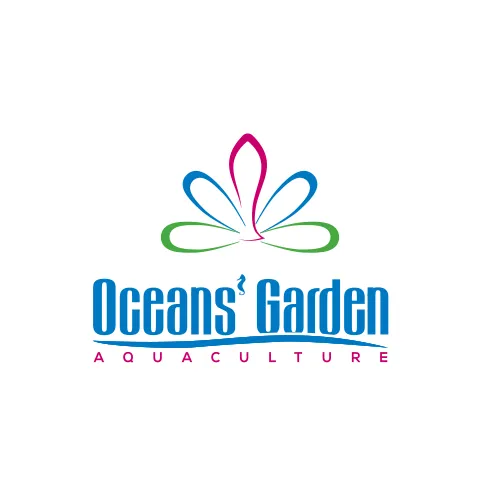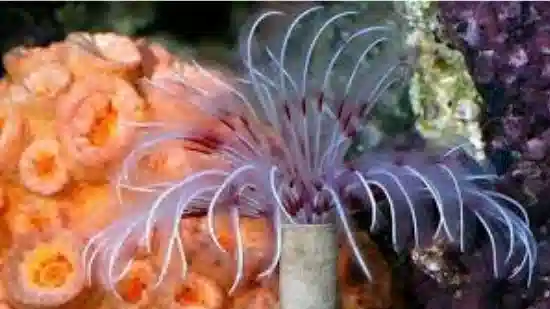Dwarf Feather Duster: Pink
Sabella sp.
(20 Reviews)

Dwarf Feather Duster: Pink
Sabella sp.
(20 Reviews)
{{ item.name }}
Size: {{ item.extra_field_3 }}
${{ getFormattedPrice(item.saleprice) }} ${{ getFormattedPrice(item.price) }}
To join the waiting list, click here
Free Shipping
With
$199.00
or more in Marine Life.
More details...
Dwarf Feather Duster: Pink Care Facts
| Care Level: | Easy |
|---|---|
| Temperament: | Peaceful |
| Diet: | Filter Feeder |
| Reef Safe: | Yes |
| Minimum Tank Size: | 10 Gallons |
| Max Size: | 1 inch |
The Feather Duster (Sabella sp.) also known as the Fan Worm, is a marine segmented worm that attaches its calcium-carbonate tube to a rocky or sandy substrate by its base. The worm lives inside this protective tube. They then have a feathery crown that peeks out filtering the water column for food using its specialized tentacles. Their tentacles are completely retractable and can be fascinating to watch open and close.
The Pink Dwarf Feather Duster: A Flash of Elegance in Saltwater Aquariums
The Pink Dwarf Feather Duster (Sabella sp.), also known as the Pink Feather Duster, is a unique and enchanting species that can add a touch of wavy elegance to saltwater aquariums. With its delicate appearance and unique characteristics, this feather duster has become a sought-after choice among marine aquarists. Let's explore the Pink Dwarf Feather Duster's habitat, reef-safe nature, size, lifespan, diet, aquaculture potential, molting process, other common names, and compatible tank mates.
Habitat of the Pink Dwarf Feather Duster
The Pink Dwarf Feather Duster is commonly found in tropical and subtropical waters of the Indo-Pacific region, including the Indian Ocean and the western Pacific Ocean. In the wild, they inhabit coral reefs and other hard substrate surfaces, attaching themselves to crevices and crests.
Reef Safe and Filter Feeding
The Pink Dwarf Feather Duster is entirely reef-safe and poses no threat to corals or other invertebrates. They are filter-feeding organisms that use their feathery appendages to capture microscopic food particles from the water.
Size and Lifespan
Pink Dwarf Feather Dusters can grow up to 1.5 inches (4 cm) in length, including their feathery crown. They can have a lifespan of several years with proper care in a well-maintained aquarium.
Diet and Feeding Behavior
In their natural habitat, Pink Dwarf Feather Dusters are filter feeders, using their feathery appendages to collect plankton and organic particles from the water. In a home aquarium, they will filter-feed on suspended particles, phytoplankton, and other microorganisms naturally present in the water.
Aquaculture and Sustainability
The Pink Dwarf Feather Duster is available in the aquarium trade, and captive-bred specimens are slowly becoming available. Captive-bred feather dusters are more sustainable when available and help reduce the impact on wild populations.
Molting Process
Pink Dwarf Feather Dusters undergo molting as part of their growth process. During molting, the worm will shed its old tube and produce a new, larger one. This process helps them grow and replace worn-out body parts.
Other Common Names
Besides the name "Pink Dwarf Feather Duster," this species is also known as the "Pink Sabellid Worm."
Compatible Tank Mates
Peaceful clownfish can coexist harmoniously with the Pink Dwarf Feather Duster. The presence of feather dusters can add a touch of natural diversity to the clownfish's habitat.
These small and peaceful fish share a compatible tank environment with the feather duster.
Peaceful gobies can cohabit harmoniously with the Pink Dwarf Feather Duster, adding diversity to the tank.
Some species of blennies are suitable tank mates that add character and charm to the aquarium.
Peaceful royal grammas can be compatible tank mates, provided the aquarium is adequately sized and has plenty of hiding spots.
In conclusion, the Pink Dwarf Feather Duster (Sabella sp.) is a captivating addition to saltwater aquariums. Its delicate appearance and filter-feeding abilities make it an excellent choice for reef aquariums seeking to enhance their natural beauty. Aquarists can enjoy the elegance and grace of these unique feather dusters in their aquatic havens by providing them with a suitable environment and compatible tank mates.
Nice livestock
Reviewed by: Charles Hodges on Sept. 23, 2024
Reviewed by: Javier Gonzalez on Aug. 20, 2024
Reviewed by: Gary Sparks on Aug. 4, 2024
Reviewed by: Paige Hutchinson on July 3, 2024
Reviewed by: Brian Carr on June 25, 2024
Reviewed by: Paul Krumm on June 25, 2024
Reviewed by: Bryan Steele on May 21, 2024
Reviewed by: Mingxuan Wang on May 5, 2024
Arrived in great shape and had his "feathers" out minutes after being put in his new home.
Reviewed by: Brian Clark on April 26, 2024
These are so adorable. They were a lot longer than I expected but healthy and pretty for sure.
Reviewed by: Cyndi Schultz on April 25, 2024
Great filter feeders. Nice subtle pink. Perfect for nano reefs.
Reviewed by: Gino Chong Inhin on March 18, 2024
Reviewed by: Wilfredo Castillo on March 13, 2024
Reviewed by: Reynaldo Sosa on Nov. 20, 2023
Reviewed by: Jean-Paul Haddad on Nov. 15, 2023
Reviewed by: Christopher Weekes on Nov. 14, 2023
Reviewed by: Chris Hobbins on Oct. 25, 2023
Reviewed by: Bill Navarrette on Oct. 22, 2023
Beautiful and hardy
Reviewed by: Vincent Amrhein on July 3, 2023
Reviewed by: Thomas Lopresto on June 27, 2023
Reviewed by: David Orear on June 27, 2023








